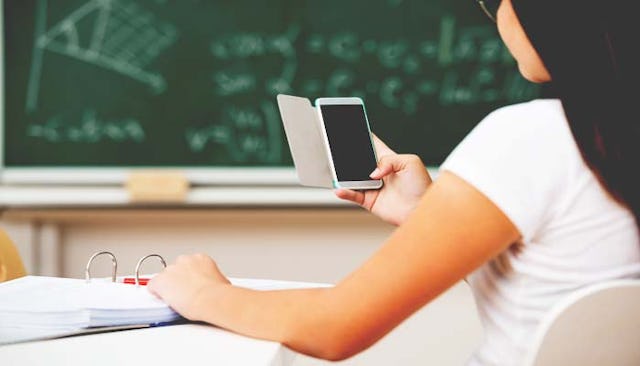Cell Phones In Schools Are Affecting Our Kids' Grades Big-Time

A new study on students’ test performance and smartphones found kids who attend schools with smartphone bans did better on tests — even more so if they were struggling academically before the ban was instituted.
Researchers at the London School of Economics gathered test scores from thousands of 16-year-olds between 2000 to 2012, studying the effects of cell phone bans on schools. The found that the bans boosted test scores by six percent. If a child was previously academically underperforming, their scores improved up to 14 percent. Dr. Richard Murphy, assistant professor of Economics at the University of Texas and co-author of the study, told Yahoo Parenting, “Our conclusion is that unstructured use of phones in schools has a negative impact, mainly for kids at the bottom half of the class. Schools should consider having a policy restricting phone use.”
Liz Kolb, an assistant professor at the University of Michigan School of Education and author of Toys to Tools: Connecting Student Cell Phones to Education, says close to 70 percent of schools that had cell phone bans in place five years ago are reversing their policies. Why? “Part of it is because it’s hard to fight the tidal wave and there’s so many students with cell phones. The second part is that they’re really seeing them as a learning tool, not just a toy for entertainment, and they’re seeing that they can be cost effective for the schools instead of having to purchase technology for students.”
Basically, cell phones don’t provide much more of a distraction than students already have, and students should be learning to embrace the technology as a learning tool. This is great if kids are using the device as a learning tool and not just stealthy texting their friends all day. It’s important to embrace technology and teach our kids to do the same, but the fact that we finally have research pointing to the effect the phones are having on academic performance should be enough for us to collectively decide that there needs to be more restrictions. Just because something is becoming the new norm, doesn’t mean it can’t be re-evaluated.
Just take a look around next time you’re out and you’ll see the effects of our collective addiction to technology. Can you remember the last time you were in a public space and didn’t see someone glued to their phone? We’re just giving teachers yet another mountain to climb in their efforts to reach students. Expecting teens to focus with smartphones in their reach is absurd. Almost as absurd as the idea that our kids need to be able to reach us via their own phone every time they leave the house.
If the need to be able to reach our children is trumping the negative effects we now know cell phones have on academic performance — we have a problem. Do we actually believe our kids can’t make it to and from school without a Batline to a parent? We may be teaching our kids to navigate mobile devices, but we’re neglecting to teach them to navigate the real world. Getting to and from a place on your own without a cell phone is a skill many kids today just don’t have because we are crippling them with the phone-crutch.
There are so many factors to consider when deciding whether a cell phone ban is the right move. But we need to make sure those factors are predominantly based on what will benefit our students academically. Just because the technology happens to be available, doesn’t mean we should be using it at all times — and it definitely doesn’t mean our kids should.
Related post: 10 Things You Need To Know About Raising A Teenager
This article was originally published on